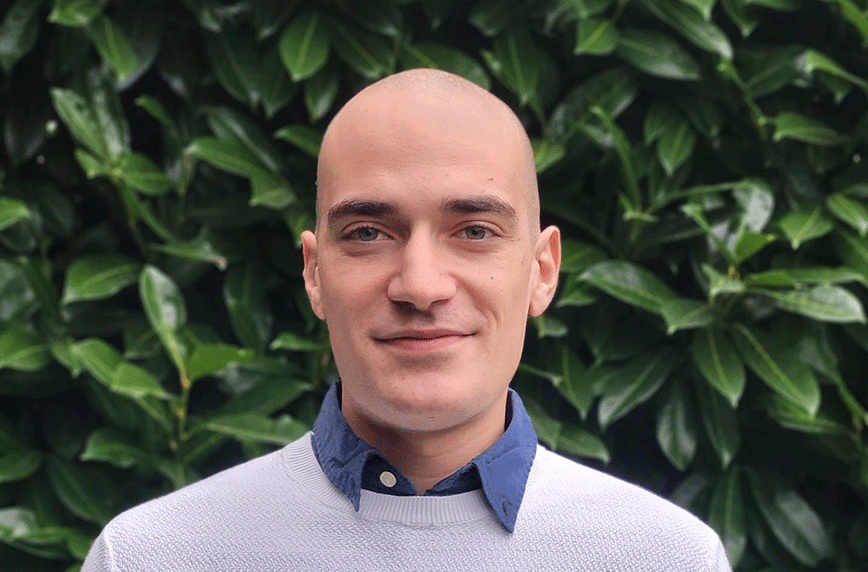Dimitrios
Dimitrios is originally from Greece. As an undergraduate student, he studied Physics and was captivated by how it intersected with Chemistry, Biology, and Medicine during his thesis work. This experience inspired him to pursue a master’s in Nanotechnology at KTH. In his free time, he likes to play chess, dabble in abstract painting, and watch movies from different cultures.

Why did you choose this master's’s programme at KTH?
Nanotechnology was a passion I did not know I had because I did not know it existed, and secondly, I hadn't realized it would be a career and life journey worth devoting my time to. From a very young age, I knew Physics had a hold on me like no other course in school. Explaining phenomena and mechanisms that we see daily and being able to predict why they happen the way they do using austere formalism like mathematics has always been fascinating to me.
Another one of my biggest inspirations was my grandfather, Savvas Papadopoulos. He was a pathologist with the most extensive knowledge I have ever encountered. From poetry to foreign languages, he was a true inspiration. He always told me how much he wished for one of his grandchildren to take on his profession, and after one of those conversations, I decided to make that dream come true. I decided to study what I have always loved and apply the explanatory virtues of physics in medicine. How does one become a physicist who conducts research in Bio-Medicine? Through Nanotechnology!
Have you chosen a specialisation track within the programme? If Yes, which track and why?
I selected the track Nanomaterials. Of the two options, Nanomaterials is more biomedically laden, and it has thus allowed me to bridge the gap between physics and biomedical applications.
Conservatively speaking, it is a specialisation that can be seen as a jack of all trades due to its applicability in virtually every sector, from cosmetics to biomedicine, environmental engineering, kitchenware, the automobile industry, and so much more.
What are some of your favourite courses so far?
Thus far, I have taken nine courses during my first year, most of which involved hands-on work in laboratory settings. Some honourable mentions among them ought to be "Nanofabrication Techniques," where I entered a clean room facility for the first time, and "Methods and Instruments of Analysis," which covers most analytical and imaging techniques used in the research or manufacturing industries.
Coming from a university where the tools available to students were typically two or three generations behind state-of-the-art, the modern facilities and tools that laboratories in KTH have made courses that involved practical exercises in such rooms unforgettable. Not to mention the confidence boost of knowing that what you practice as an exercise can later be applied and help you secure a job offer.
Of course, not all great courses cover experimental aspects of science, and I could not answer this question without mentioning "Nanothermodynamics". It has been one of my favourite courses, with a syllabus covering literature published as recently as this year. It was a very interesting course by a fantastic professor whose passion for the field was highly contagious.
What do you want to do after graduating?
After graduating, I wish to take the next step in my academic journey by pursuing a PhD. Although I don't know what novelty I would work on, based on my experience here so far, I am confident that this programme will be very insightful and possibly a key factor in determining that.
The next step after a PhD is a professor or research position in a university or an institute. From there, I aim to research the diagnosis and treatment of chronic conditions that have troubled people for centuries and decreased their quality of life. Simultaneously, being able to give lectures and become a knowledge beacon for the younger generations would be a privilege and fulfil my sense of duty towards tomorrow's society.
Becoming a member of the research community has been a long-time dream of mine. I was influenced by aspirations and inspirations that emerged from interacting with family members, friends, professors, and schoolteachers. Those have become potent fertilisers that will help my dreams flourish. And who knows, perhaps one day I will be part of someone's reasons for wanting to become a researcher.
What would you like to say to students thinking of choosing KTH for master's studies?
Dear (potential) future colleagues, make sure that you have thoroughly researched the programme you are considering. Understand that KTH will undoubtedly offer high-quality education to all of you sitting in its lecture halls and laboratories in the coming academic year. Choosing KTH was a very easy decision because I knew what I wanted from my programme. So, if I can give you one piece of advice, check whether KTH and the programme you are looking for specifically bring you closer to where you want to be. From someone who has already been here for a year, quality of education, modern equipment and facilities, and networking opportunities within and outside the academic ecosystem have been given and of the highest quality.
That being said, I also believe that KTH can be a significant milestone for the personal and academic growth of every student willing to keep an open eye and ear. So even if your dreams or plans are still foggy, remember that in contemporary times, being educated and then employed in a single sector without further readjustments is (gladly) very rare. This means that irrespective of where you might be in the next decade, taking this step will most likely never be on your "regrets" list. You'll see it as a life-changing moment or a very insightful and somewhat humorous time of your life.
